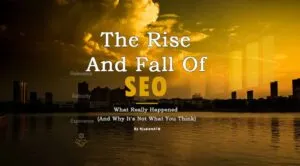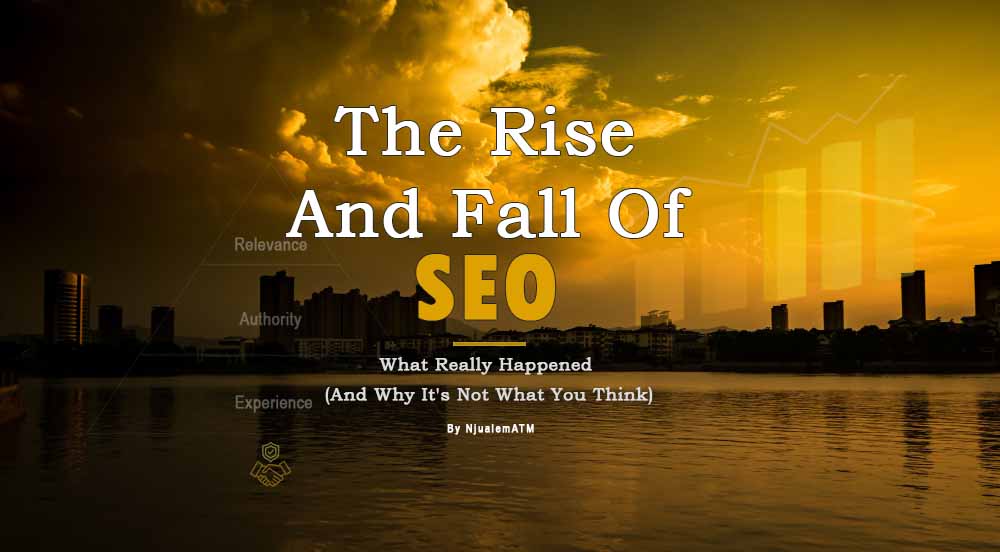Imagine trying to find a specific piece of information in 1995. You’d go to a library, flip through card catalogs, hunt through encyclopedias, or make phone calls to experts. Finding answers took hours or days, and you often settled for whatever you could find rather than what you needed.
Then something extraordinary happened. In just a few short years, we went from information scarcity to having the world’s knowledge at our fingertips. The story of how that transformation occurred isn’t just fascinating history reveals why some businesses thrive online today while others struggle to be found, no matter how good their services are.
The origin of search is the story of solving humanity’s oldest problem: how do you find what you need in an ocean of information?
Understanding this evolution isn’t just interesting, it’s the key to making your business visible to the people who need you most.
1. The Birth of the Web (1990s) – When Information Became Overwhelming
In the early 1990s, something unprecedented happened in human history. For the first time, regular people had access to more information than they could process. The World Wide Web exploded from a few hundred websites to millions almost overnight.
But here’s the problem nobody anticipated: having access to everything meant you couldn’t find anything. It was like having the world’s largest library with no card catalog, no filing system, and books scattered randomly across infinite shelves.
Tim Berners-Lee had solved the problem of connecting information across computers, but he’d accidentally created a new problem: information chaos. People were drowning in data they couldn’t navigate.
This crisis of abundance sparked one of the most important innovations in human history: the search engine. Companies like Archie, AltaVista, Lycos, Yahoo!, and eventually Google in 1998 weren’t just building technology; they were solving a fundamental human need that had never existed before at this scale.
These early pioneers faced a question that seems simple but was revolutionary: How do you help people find exactly what they need from billions of pieces of information, instantly, without them having to know where to look?
The answer to that question would reshape not just how we access information, but how businesses connect with customers, how knowledge spreads, and how we make decisions about everything from what to buy to where to eat dinner.
2. The First Solution: Early Search Engines Try to Make Sense of Chaos (Mid to Late 1990s)
The first search engines faced an impossible task: how do you teach a computer to understand what information is useful to a human being?
Their initial approach was beautifully simple and fatally flawed. They figured that if someone was searching for “dog training,” then pages that mentioned “dog training” the most times were probably the most relevant. It was like judging a book’s quality by counting how many times it repeated its title.
This method worked… sort of. People could finally find information instead of randomly clicking through websites, hoping to stumble across what they needed. For the first time in human history, you could type a question into a box and get some kind of answer in seconds.
But this breakthrough created an unintended consequence that still affects businesses today: it taught people that success online meant gaming the system rather than serving customers.
Smart website owners quickly discovered they could stuff keywords into hidden areas of their pages, repeat phrases unnaturally throughout their content, and trick search engines into thinking their pages were more relevant than they were. The focus shifted from “How do we help people?” to “How do we manipulate the algorithm?”
This period established a myth that haunts businesses even now: the idea that online success comes from outsmarting technology rather than genuinely helping people find what they need.
3. The Breakthrough: Google’s Revolutionary Insight (1998 onwards)
Two Stanford graduate students, Larry Page and Sergey Brin, had a brilliant realization that changed everything: instead of trying to guess what information was valuable, why not let the internet tell you?
Their insight was elegantly human: when someone creates a link to another website, they’re essentially saying, “this is worth your attention.” It’s like a recommendation from one person to another. The more recommendations a page received from reputable sources, the more valuable it was.
This was the birth of PageRank—named after Larry Page—and it solved the relevance problem in a way that felt natural to how humans share information. Instead of counting keywords, Google counted trust.
The results were immediately obvious to anyone who used it. While other search engines returned pages full of keyword-stuffed garbage, Google consistently served up helpful information. It was like the difference between asking for restaurant recommendations from a random person on the street versus asking someone whose taste you trust.
But this breakthrough also triggered an arms race that continues today. If links were votes, then people would find ways to manufacture votes. The link-building industry exploded, companies started creating networks of fake websites just to link to each other, buying and selling links like commodities, and treating the web like a giant popularity contest rather than an information resource.
This period established the second major myth about online success: that visibility comes from accumulating signals (links, mentions, shares) rather than earning them through genuine value.
4. The Great Awakening: When Search Engines Learned to Think Like People
By the 2010s, Google faced a new problem: its success had created an entire industry dedicated to manipulating its results. The web was filling up with content created not to help people, but to fool algorithms. Search results were becoming less useful, not more.
This led to what many consider the most important period in search history—a series of updates that fundamentally changed how search engines work:
The Panda Revolution (2011): Google essentially declared war on content created purely for search engines rather than humans. Websites that existed only to rank highly, filled with thin, repetitive, or unhelpful content, saw their visibility disappear overnight. The message was clear: if real people don’t find your content valuable, neither will we.
The Penguin Precision Strike (2012): This update went after the link manipulation industry. All those purchased links, link farms, and artificial link networks suddenly became liabilities instead of assets. Google had learned to distinguish between links that represented genuine recommendations and those that were simply gamed.
The Mobile-First Revolution (2015): When smartphones became the primary way people accessed the internet, Google made a crucial decision: they would judge websites primarily by how well they worked on mobile devices. This wasn’t just a technical change—it was an acknowledgment that people’s relationship with information had fundamentally shifted.
The Experience Update (2021): With Core Web Vitals, Google made user experience an official ranking factor. Pages that loaded slowly, shifted around while loading, or were difficult to interact with would be penalized, regardless of their content quality.
Each of these changes pointed toward the same profound shift: search engines were learning to evaluate websites the same way humans do. Does this help me? Is it easy to use? Can I trust it? Does it answer my question completely?

The Modern Reality: Search Has Come Full Circle
Here’s the fascinating thing about where we’ve ended up: after 30 years of technological evolution, search engines have learned to want the same things that made for good business before the internet existed.
Think about what Google rewards today:
- Expertise: Demonstrating deep knowledge in your field
- Trustworthiness: Building a reputation people can rely on
- Helpful content: Solving problems for your audience
- Good user experience: Making it easy for people to get what they need
- Authority: Being recognized by others in your industry
These aren’t “SEO tactics,” they’re the fundamentals of any successful business. The revolution in search technology has brought us back to something beautifully simple: the companies that help people the most effectively are the ones that get found most often.
This is why over 90% of online experiences still begin with a search engine. It’s not just about finding information anymore—it’s about finding solutions, answers, and businesses that can genuinely help with whatever challenge someone is facing.
For service-based businesses, this evolution is liberating. You don’t need to become a technical expert or master complex algorithms. You need to become exceptionally good at understanding and serving the people who need your help.
The companies dominating search results today aren’t necessarily the most technically sophisticated; they’re the ones that have earned their position by consistently demonstrating they can solve real problems for real people.
What This Means for Your Business
The origin story of search reveals something profound: we’ve spent 30 years building technology sophisticated enough to recognize genuine value. The algorithms can now spot the difference between content created to help people and content created to manipulate rankings.
This means the path to search visibility has become remarkably straightforward: focus on being genuinely helpful to your ideal customers, make sure your website works well for the people who visit it, and consistently demonstrate your expertise in ways that build trust over time.
The businesses winning at search today aren’t playing a technical game; they’re playing a human game. They understand that behind every search query is a person with a real need, and they’ve organized their entire online presence around meeting that need better than anyone else.
The origin of search brought us from information chaos to a system that rewards authentic value. The question isn’t whether you can game that system; it’s whether you’re ready to earn your place in it.
Ready to see where your business stands in today’s search landscape?
Take an honest look at your current approach: Are you still fighting yesterday’s battles with keyword stuffing and link schemes, or have you embraced the modern reality that search rewards genuine value?
I help service-based businesses audit their digital presence and build visibility strategies that work in today’s environment.









